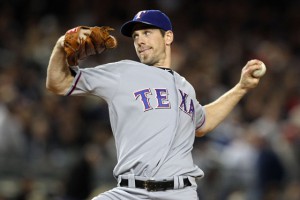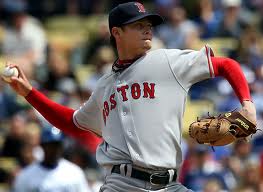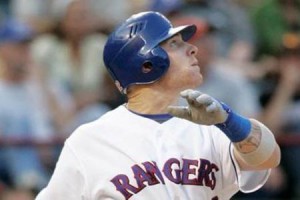
Cliff Lee. Photo: Al Bello/Getty Images
As Cliff Lee continues to dazzle in the post season (his most recent effort being his 8inning, 2hit 13k gem against the most potent offense in Baseball, your NY Yankees), rumors of his purported price tag in the Free Agency market continue to reach spiraling heights. The most common numbers thrown out start at 5yrs, $25M per. One author at Forbes thinks he may approach $200M for 6 years combining salary and endorsements.
If you are trying to compare talent to contract value, then you have to start with the highest paid pitchers at current. CC Sabathia is at $23M/year, Johan Santana is at $22.9M/year on average, and Roy Halladay took a slight discount to sign with Philadelphia (and be able to live in his offseason Odessa home 2 extra months of the year and drive to Spring Training) and is making $20M/year on his new deal. Clearly, Cliff Lee has shown that he belongs at least at the $20M/year scale. But how much higher makes sense financially for the signing team?
Forgetting for the moment that payroll means very little to a team like the New York Yankees (unfortunately his likely destination), lets talk about the value of the Free Agent contract and whether a team that gives out a $25M/year contract can ever really get their money’s worth. Baseball is filled with horror stories of huge FA contracts that went bust. Names like Zito, Dreifort, Pavano, Neagle, and Hampton fill general managers and fan’s heads with dispair.
How bad were these contracts? I put together a spreadsheet with every significant starting pitcher FA contract that I could find, then cross referenced it by the Pitcher’s Won/Loss record during the duration of the contract. See below: the table is sorted in reverse order of $/win. In addition to the major FA contracts, I also arbitrarily added every “Ace” starter in the league, resulting in names like Lee, Jimenez, Price and Buchholz being in this list despite not being major FA pitchers (yet). Their inclusion illustrates one of my major conclusions below.
| Pitcher |
Team |
Total Value (includes club options) |
$$/year Avg |
Contract Term |
W/L |
$ per win |
| Kei Igawa |
New York Yankees |
$46,000,000 |
$9,200,000 |
2007-11 |
2-4 |
$18,400,000 |
| Jason Schmidt |
Los Angeles Dodgers |
$47,000,000 |
$15,666,667 |
2007-09 |
3-6 |
$15,666,667 |
| Kei Igawa |
New York Yankees |
$20,000,000 |
$4,000,000 |
2007-11 |
2-4 |
$8,000,000 |
| Darren Dreifort |
Los Angeles Dodgers |
$55,000,000 |
$11,000,000 |
2001-05 |
9-15 |
$6,111,111 |
| Russ Ortiz |
Arizona Diamondbacks |
$33,000,000 |
$8,250,000 |
2005-08 |
7-22 |
$4,714,286 |
| Roger Clemens |
New York Yankees |
$28,000,022 |
$28,000,022 |
2007 |
6-6 |
$4,666,670 |
| Carl Pavano |
New York Yankees |
$39,950,000 |
$9,987,500 |
2005-8 |
9-8 |
$4,438,889 |
| Denny Neagle |
Colorado Rockies |
$51,000,000 |
$10,200,000 |
2001-05 |
19-23 |
$2,684,211 |
| Jake Peavy |
San Diego Padres |
$52,000,000 |
$17,333,333 |
2010-12 |
7-6 |
$2,476,190 |
| Carlos Silva |
Seattle Mariners |
$48,000,000 |
$12,000,000 |
2008-12 |
15-24 |
$2,400,000 |
| Mike Hampton |
Colorado Rockies |
$121,000,000 |
$15,125,000 |
2001-08 |
56-52 |
$2,160,714 |
| Chan Ho Park |
Los Angeles Dodgers |
$65,000,000 |
$13,000,000 |
2002-06 |
33-33 |
$1,969,697 |
| Barry Zito |
San Francisco Giants |
$126,000,000 |
$18,000,000 |
2007-13 |
40-57 |
$1,800,000 |
| Johan Santana |
New York Mets |
$137,500,000 |
$22,916,667 |
2008-13 |
40-25 |
$1,718,750 |
| Pedro Martinez |
New York Mets |
$54,000,000 |
$13,500,000 |
2005-08 |
32-23 |
$1,687,500 |
| Carlos Zambrano |
Chicago Cubs |
$91,500,000 |
$18,300,000 |
2008-12 |
34-19 |
$1,614,706 |
| Gil Meche |
Kansas City Royals |
$55,000,000 |
$11,000,000 |
2007-11 |
29-39 |
$1,517,241 |
| Daisuke Matsuzaka |
Boston Red Sox |
$103,000,000 |
$17,166,667 |
2007-12 |
46-27 |
$1,492,754 |
| Kevin Brown |
Los Angeles Dodgers |
$105,000,000 |
$15,000,000 |
1999-2005 |
72-45 |
$1,458,333 |
| A.J. Burnett |
New York Yankees |
$82,500,000 |
$16,500,000 |
2009-13 |
23-24 |
$1,434,783 |
| Roger Clemens |
New York Yankees |
$18,000,000 |
$18,000,000 |
2005 |
13-8 |
$1,384,615 |
| Felix Hernandez |
Seattle Mariners |
$78,000,000 |
$15,600,000 |
2010-14 |
13-12 |
$1,200,000 |
| John Lackey |
Boston Red Sox |
$82,500,000 |
$16,500,000 |
2010-14 |
14-11 |
$1,178,571 |
| Jarrod Washburn |
Seattle Mariners |
$37,000,000 |
$9,250,000 |
2006-09 |
32-52 |
$1,156,250 |
| Chris Carpenter |
St. Louis Cardinals |
$50,800,000 |
$12,700,000 |
2008-11 |
33-13 |
$1,154,545 |
| Kevin Millwood |
Texas Rangers |
$60,000,000 |
$12,000,000 |
2006-10 |
52-62 |
$1,153,846 |
| C.C. Sabathia |
New York Yankees |
$161,000,000 |
$23,000,000 |
2009-15 |
40-15 |
$1,150,000 |
| Roy Oswalt |
Houston Astros |
$73,000,000 |
$14,600,000 |
2007-11 |
52-36 |
$1,123,077 |
| Bartolo Colon |
Los Angeles Angels |
$51,000,000 |
$12,750,000 |
2004-07 |
46-33 |
$1,108,696 |
| Mark Buehrle |
Chicago White Sox |
$56,000,000 |
$14,000,000 |
2008-11 |
41-35 |
$1,024,390 |
| Ryan Dempster |
Chicago Cubs |
$52,000,000 |
$13,000,000 |
2009-12 |
26-21 |
$1,000,000 |
| Derek Lowe |
Atlanta Braves |
$60,000,000 |
$15,000,000 |
2009-12 |
31-22 |
$967,742 |
| Mike Mussina |
New York Yankees |
$88,500,000 |
$14,750,000 |
2001-06 |
92-53 |
$961,957 |
| Justin Verlander |
Detroit Tigers |
$80,000,000 |
$16,000,000 |
2010-14 |
18-9 |
$888,889 |
| Josh Johnson |
Florida Marlins |
$39,000,000 |
$9,750,000 |
2010-2013 |
11-6 |
$886,364 |
| Pedro Martinez |
Boston Red Sox |
$92,000,000 |
$15,333,333 |
1998-04 |
117-37 |
$786,325 |
| Bronson Arroyo |
Cincinnati Reds |
$25,000,000 |
$12,500,000 |
2009-10 |
32-23 |
$781,250 |
| Josh Beckett |
Boston Red Sox |
$42,000,000 |
$8,400,000 |
2007-10 |
55-29 |
$763,636 |
| Daisuke Matsuzaka |
Boston Red Sox |
$52,000,000 |
$8,666,667 |
2007-12 |
46-27 |
$753,623 |
| Ted Lilly |
Chicago Cubs |
$40,000,000 |
$10,000,000 |
2007-10 |
54-21 |
$740,741 |
| Zack Greinke |
Kansas City Royals |
$38,000,000 |
$9,500,000 |
2009-12 |
26-22 |
$730,769 |
| Tim Lincecum |
San Francisco Giants |
$23,000,000 |
$11,500,000 |
2010-11 |
16-10 |
$718,750 |
| Mike Mussina |
New York Yankees |
$22,141,452 |
$11,070,726 |
2007-08 |
31-19 |
$714,240 |
| Matt Cain |
San Francisco Giants |
$27,250,000 |
$9,083,333 |
2010-12 |
13-11 |
$698,718 |
| Roy Halladay |
Toronto Blue Jays |
$40,000,000 |
$13,333,333 |
2008-10 |
58-31 |
$689,655 |
| Derek Lowe |
Los Angeles Dodgers |
$36,000,000 |
$9,000,000 |
2005-08 |
54-48 |
$666,667 |
| Cole Hamels |
Philadelphia Phillies |
$20,500,000 |
$6,833,333 |
2009-11 |
22-22 |
$621,212 |
| Jason Schmidt |
San Francisco Giants |
$40,000,000 |
$8,000,000 |
2002-06 |
71-36 |
$563,380 |
| Brandon Webb |
Arizona Diamondbacks |
$28,000,000 |
$5,600,000 |
2006-10 |
56-25 |
$500,000 |
| Jon Lester |
Boston Red Sox |
$43,000,000 |
$7,166,667 |
2009-14 |
34-17 |
$421,569 |
| Adam Wainwright |
St. Louis Cardinals |
$36,000,000 |
$6,000,000 |
2008-13 |
50-22 |
$360,000 |
| Cliff Lee |
Cleveland Indians |
$23,000,000 |
$4,600,000 |
2006-10 |
67-44 |
$343,284 |
| Ubaldo Jimenez |
Colorado Rockies |
$23,750,000 |
$3,958,333 |
2009-14 |
34-20 |
$232,843 |
| David Price |
Tampa Bay Rays |
$11,250,000 |
$1,875,000 |
2007-12 |
29-13 |
$64,655 |
| Clay Buchholz |
Boston Red Sox |
$443,000 |
$443,000 |
2010 |
17-7 |
$26,059 |
Comment on Won/Loss records; yes I know that individual pitcher wins are not a great indicator of a starter’s worth. However, they do reasonably indicate over the course of a longer term period the value of that pitcher to a team. Perhaps a better argument is free agent dollars per quality start (despite the quality start measuring basically a mediocre start of 3ER or less in 6ip or more by a pitcher, it does generally correlate well to team wins andveven to a “real” quality start of 2ER or less in 6IP or more). At some point I’ll re-run the analysis and count up QS per FA dollar to see how it compares.
Note for the purposes of this argument:
- The Contract total value is averaged over the life of the contract, even if the payments are different during different years.
- The W/L record is for the pitcher over the life of the contract, not necessarily for the original signing team.
- If the contract is current (i.e., runs from 2009-2012) then I’ve only counted the completed regular seasons.
- There are no off-season records taken into play.
- I entered in both Japanese Pitchers (Igawa and Matsuzaka) with massive posting numbers twice; one factoring the posting fee and the other not. Without the fee Dice-K looks halfway decent but with it he’s overpriced (something all Boston fans probably already knew about their highly paid #5 pitcher).
Conclusions.
– If you can get 1 win per $1M expended, you are doing about average it seems. Anything above $1.25M and you are looking at a questionable contract.
– It is difficult to look at any contract below $1M/victory and say that the team made a bad deal.
– The absurdly low $/victory values for David Price and Clay Buchholz demonstrate as clearly as possible the value of the pre-arbitration superstar. Tampa Bay (who did a similarly shrewd deal with Evan Longoria, buying out the arbitration years and tying the player to the club past the 6-year pre-FA window) now gets Cy Young-quality starts from Price for the next two years at 1/20th his market value. Buchholz is even more evident; at a pre-arbitration salary of $443,000 for 2010, he went 17-7 and gave the Red Sox #1 starter capabilities. On the open market he’s worth at least $15M/year at that level of productivity.
– The worst FA contract ever given to a starting pitcher wasn’t one of the aforementioned infamous culprets; it belongs to one Kei Igawa. The Yankees paid the posting fee of $26M just to negotiate with him, then signed him to a 5 year, $20M contract. For that outlay of $46M guaranteed, the Yankees have gotten a record of 2-4 over parts of two seasons, and he hasn’t appeared in a MLB game since June of 2008. Luckily the Yankees can afford it; this kind of FA mistake would cripple a mid-to-small market team for years.
– Jason Schmidt‘s 3yr, $47M deal with the LA Dodgers is the largest $$ bust in terms of a pure FA play, not counting the vagarities of the Japanese posting system. Schmidt had ironically just finished an incredibly efficient deal with San Francisco, where he went 71-36 over 5 seasons on a $40M contract (resulting in a very good $/win number of $563,380). Six games into his Dodger career he went onto the DL list with shoulder injuries that eventually cost him the rest of 2007 and all of 2008. He tried to regroup in 09, failed to make the team out of spring, made a few starts and was back on the DL. All told, 3 wins in 10 starts for $47M.
– Some of the infamous deals do appear close to the top of this list; Neagle’s $51M for a 19-23 record. Dreifort’s $55M deal resulting in a grand total of 9 wins and only 26 starts. Ironically, the highest single season salary was Roger Clemen‘s $28M deal with New York in 2007. For that money the Yankees got a middling 6-6 record.
– Are there any major FA deals that ARE paying off? Well, you have to dig deep. CC Sabathia has won 40 games for the Yankees in the first two years of his $23M/year deal, which is easily the best 9-figure deal. However, it is early; we need to check back in years 6 and 7 of this deal. Mussina went 92-53 for the Yankees after he signed his $88M deal in 2001. Verlander won 18 games this year for his $16M annual salary and looks like a good bet to continue that trend.
– The BEST long term FA deal ever signed has to be Pedro Martinez‘s 6year $92M deal. He went 117-37 between 1998-2004, won 3 Cy Youngs, had 2 Cy Young runners-up, and in the year 2000 posted an ERA+ of 291, which accounts for the best modern-day single-season pitching performance in the history of the game.
Bringing this back to Cliff Lee; the conclusion is thus; he may earn a $25M/year deal but the odds of his continuing to win 20-22 games/year for the duration of the contract and thus inflating the $/win value will eventually prove that contract to be an albatross (even more so if he misses significant time to injury at some point).


